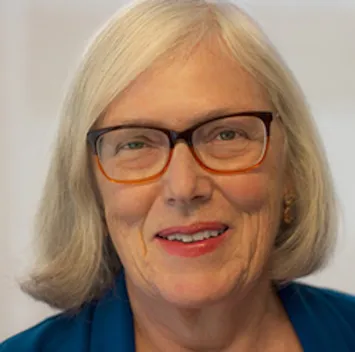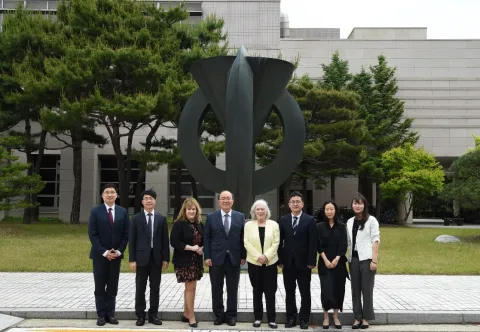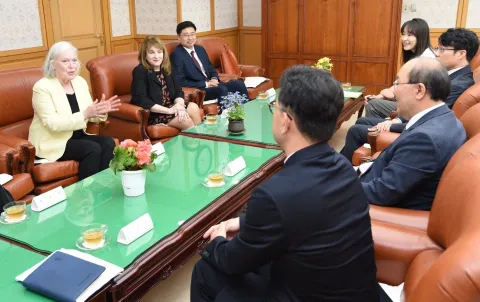IOJT Bulletin, July 2024
President's Message
Welcome to the first edition of The Bulletin, IOJT's newsletter which we hope will provide information and inspiration to judicial institutes, judicial trainers, and judges. Let me explain our objectives and what you can expect in each edition. We hope that The Bulletin will be an on-going communication tool, permitting the Board of IOJT to provide information about upcoming events and permitting members to share successes and challenges that have been encountered as we do our work. It will, we hope, be one of the ways IOJT can become a virtual community.

In each edition, there will be a few words from the President about past and future events and other IOJT news. Our Secretary-General, Mary McQueen, will report on any Board business, and as in this edition, she gives us information about our biennial conference this fall. We will have a report from our Treasurer and news from the Regional Vice-Presidents about IOJT activities in their regions. And finally, in our section "IOJT Highlight," we will showcase a program, teaching success or other work that an institute or trainer has done. To help ensure that we are talking about things that are relevant to judicial training and judges, three colleagues from around the world have agreed to act as an editorial board. Their job is to make suggestions about topics and review submissions to ensure relevance to IOJT goals. I am pleased to announce that Justice Kristina Stern (Australia), Justice Kiri Tahana (New Zealand) and Justice Gianluca Grasso (Italy) have agreed to take on this role. Thank you to all three.
We are looking to all of you for suggestions for "IOJT Highlight." Is there something that your institute has done recently that you think would be interesting and useful for other institutes and trainers? Have you heard about an interesting program? Please send us suggestions, either something that you would like to submit or something that we can put together. Forward any ideas to iojt@iojt.org
I look forward to seeing many of you in Seoul later this year. In the meantime, all the best, and please send in ideas for our "IOJT Highlight."
Secretary General's Message
IOJT's President, Judge Adele Kent, and I met with our Host Conference Committee in Seoul Last month. KWON Kihoon, President of the Judicial Research and Training Institute (JRTI) of the Supreme Court of Korea, and his excellent team welcomed us to their beautiful country and hosted us at the JRTI .

The theme of the 11 th IOJT Conference is " Preparing for the Future of the Judiciary – Embracing Human Rights, Technology and Effective Pedagogy."
The conference will cover the following topics:
- Judicial Education on Diversity, Inclusion, and Human Rights
- Judicial Training in the Era of Technology
- Developing and Strengthening Judicial Institutes
- Legal Issues regarding AI, Chat GPT, and Judicial Ethics
- Innovative Pedagogy: Embracing Technology in a Changing World
- Impact of the Climate Crisis and Judicial Education
- Future of Judicial Cooperation: Encouraging Cooperation among IOJT Members
The Host Committee received over 100 proposals for education presentations, the highest number in IOJT history. With that number of proposals comes the challenge for the Host Committee to organize those 100 proposals into 45 education sessions. With the wisdom and experience of the Host Committee, an excellent conference program agenda has been created.
Conference registration is open. Please check the conference website for details.


IOJT Board Elections
The IOJT General Assembly, consisting of IOJT members, will convene during the Conference on Wednesday morning November 6 to elect officers and Regional Deputy Presidents. The elected positions, which will serve four-year terms are:
- Secretary-General
- Treasurer
- Regional Deputy President – Africa
- Regional Deputy President – North/Central America and the Caribbean
Appointed positions to be considered are:
- IOJT Executive Committee Members: 2
- At Large Board of Governors: 2
The Deputy Secretary General, Raf Van Ransbeek (Belgium), will send an email to all IOJT members announcing the application process, forms, and deadline before the IOJT Conference. Any member who would like to be considered for nomination to a position, elected or appointed, will complete an application and forward it by email to the IOJT Nominations Committee. The Nominations Committee. will interview the candidates during the IOJT Conference and recommend a slate of nominees for elected positions to the General Assembly and for appointed positions to the IOJT President. Application notices will be posted in August 2024.
Regional update (submitted by Justice Amady Ba)
Vice-President for Africa and the Middle East, Justice Amady Ba, reports that in early 2024, two separate virtual meetings were held, one in English and one in French. These inaugural regional meetings were a wonderful opportunity for African members to introduce themselves to each other and share current projects and plans.
Haffide Boulakras and Raf Van Ransbeek report that in partnership with the European Judicial Training Network and Scuola Superiore della Magistratura of Italy, IOJT ran a virtual program, The Use of Social Networks by Judges: A Comparative Approach in December 2023. Several common themes came through in the presentations, including the existence of codes or guidelines to help judges navigate challenging ethical issues, addressing the tension that exists between the need for judges to remain engaged with their community with the need for judges to be impartial and independent in performing their judicial work, and the concern that judges retain the dignity of their office. Some jurisdictions have done some training of judges of the ethical implications of their involvement in social media
IOJT Committee update (submitted by Leonel Gonzalez)
On November 8, 2017, the members of the International Organization for Judicial Training (IOJT), composed of 129 judicial training institutions from 79 countries, unanimously adopted the Declaration of Judicial Training Principles at the 8th Conference held in Manila, Philippines.
The Declaration sets out guiding principles that reflect how IOJT members conceptualize and strive to implement judicial training. The principles are both the common base and the horizon uniting judicial training institutions throughout the world, regardless of the diversity of judicial systems.
In March 2024, a Working Group (made up of Leonel González Postigo, John Meeks, Elisa Samuel, Ana Zita Rowe Lopez, Andrew Hatton, and Gomolemo Moshoeu) was formed to follow up on the Declaration and carry out actions or produce materials to "keep it alive."
Within the framework of this Working Group, it was decided to carry out a survey among the members of the IOJT to know if the institutions responsible for judicial training are familiar with the Declaration, and using the principles, to subsequently decide if special session on the principles will be developed at the next IOJT Conference to be held in South Korea.
The survey was carried out between the months of April and May 2024 and yielded very interesting results on the use of the Declaration of Principles since its approval seven years ago.
We received answers from 13 institutions representative of most of the regions of the world. We had views and good practices from different cultures.
Among the main findings of the survey, we can share that:
- All of the institutions were aware of the Declaration before the survey;
- All of the institutions applied the principles;
- The principles that generate the greatest difficulties are related to funding (no. 4); time (no. 6); and the role of senior judges (no.3);
- There are many good practices reported by the institutions; and
- The majority of the organizations agreed that it is necessary to have a special session at the next IOJT Conference.
For these reasons, at the IOJT Seoul Conference we will hold a special session to discuss the principles.
IOJT Highlight (submitted by Judge Gianluca Grasso)
The Italian School for the Judiciary, Scuola Superiore della Magistratura, in cooperation with the Euro-Arab Judicial Training Network (EAJTN), organized a seminar on Judicial Ethics in Europe and in the Arab World: A Comparative Overview from March 7-8, 2024 at its premises in Naples.
The seminar was attended by representatives from all member countries of the Euro-Arab Network: France, the Netherlands, Romania, Algeria, Jordan, Morocco, Belgium, Spain, United Arab Emirates, Palestine, Kuwait, Iraq, Tunisia, and Italy.
Judges, prosecutors, and lawyers occupy a crucial position in society; therefore they have a duty to adopt the highest ethical behavior as their function has a direct impact on public trust and the administration of justice.
Independence, impartiality, and efficiency are the identifying parameters of an effective judicial system, regardless of the model of the national legal system and the tradition in which it is embedded.
Starting from the international framework and the relevant case law, the course aimed to deepen knowledge and understanding of professional tools and to develop skills, based on practical examples, to address ethical dilemmas in the exercise of professional duties.
The seminar had five sessions. The first was an introductory one, aimed at presenting the objectives of the program and the relevant resources developed by the Global Network for Judicial Integrity of the United Nations Office on Drugs and Crime (UNODC) — namely, the International Non-Binding Guidelines on the Use of Social Media by Judges, and the Judicial Ethics Training Tools. The second, third and fourth sessions included working groups on three main topics: Politics and the Judiciary, Use of Social Networks and Relationships with Non-Profit Organizations. Starting from the Bangalore Principles, insights were offered from the expert systems to allow participants to compare their own experiences. The last session saw the presentation of the Dutch School of the Judiciary's training project on behavioral ethics and conclusions.
The program and study materials, in English and French, are freely available on the school's website:
- Judicial Ethics in Europe and the Arab World_Programme-EN.pdf
- Judicial Ethics in Europe and the Arab World_Programme fr.pdf
- SSM_EAJTN_Ethics_Cases_4th draft fr.pdf
- SSM_EAJTN_Ethics_Cases_4th draft.pdf
New Members (joined 2023-2024)
- Judicial Training Institute (JTI) Somalia
- Judicial Training Institute (JTIZ) (Zimbabwe)
- Center for Legal and Judicial Training (Mozambique)
- Center for Judicial Studies (Portugal)
You can view the entire list of institute members (by region) here.
IOJT Board Members 2022-2024
Officers
- President Adele Kent (Canada)
- Secretary-General Mary McQueen (US)
- Treasurer Eileen Kato (US)
- Deputy Secretary-General Raf Van Ransbeek (Belgium)
Members
- Haffide Boulakras (France)
- Leonel Gonzalez (Argentina)
- Rainer Hornung-Jost (Germany)
- Paul Quan (Singapore/Asia)
- Amelia Wright (UK)
Regional Deputy Presidents
- Africa and Middle East Amady Ba (Senegal)
- Asia and Pacific Janine McIntosh (New Zealand)
- Europe Vacant
- North Central America and Caribbean
Danielle May-Cuconato (Canada) - South America Vacant
At Large Governors
- Daphna Blatman Kedrai (Israel)
- Gianluca Grasso (Italy)
- Dr. Gomolemo Moshoeu (South Africa)
Treasurer's report (Quarter 1 2024)
| Income | |
| Membership Fees | $16,889.87 |
| Interest Earned | $ 3.81 |
| Total Income | $16,893.68 |
| Expenses |
| Tax E-Filing Fee | $100.85 |
| Total Expenses | $100.85 |
| Cash on Hand | |
| Bank of America (3521) | $ 20,033.53 |
| Bank of America (2744) | $153,024.83 |
| Total | $173,058.36 |
Upcoming Conferences and Scholarships
11th International Conference on Training of the Judiciary
The 11th International Conference on Training of the Judiciary is being held in Seoul, South Korea, November 3-7, 2024. We hope you are planning to join us in Seoul to make new friends, to greet old friends and to advance our mission to encourage and develop Judicial training institutes and promote the Rule of Law.
Conference registration is closed.
IOJT Conference Scholarship
The IOJT is pleased to provide limited scholarship opportunities to assist member institutes to send representatives to the 11th IOJT meeting in Seoul. The scholarship application information and form can be found on the IOJT Website and should be submitted by July 31, 2024.
The scholarships are limited to nominees from current IOJT member institutes. The scholarship will assist with expenses for registration, airfare, and lodging. The number of available scholarships is very limited.
Explore more
News
Training that strengthens justice
The International Organization for Judicial Training (IOJT) was established in 2002 in order to promote the rule of law by supporting the work of judicial education institutions around the world.


